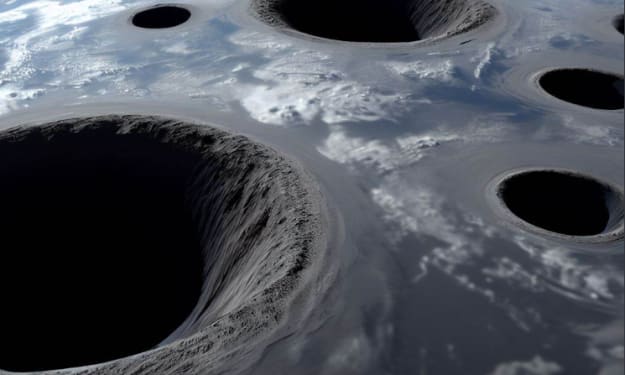Planetary Intelligence: Unveiling Earth's Enigmatic Mind
Exploring the Collective Activity of Life and the Evolution of Planetary Consciousness

Have you ever pondered the notion of Earth as an intelligent entity? Not in the sense of a living creature, but rather as a collective consciousness, possessing its own mind and survival instincts. While this might sound like a concept from a fantasy movie, it delves into the idea that the combined activity of all life forms, from microbes to plants, can influence and shape a planet, giving it a sense of conscious existence. Picture Earth as a living planet, with the biosphere acting as its team of life, working in harmony to sustain and nurture its diverse ecosystems.
The metaphor of Earth as a living planet holds merit. Creatures of all kinds traverse the globe, from crawling, swimming, and walking, to soaring through the skies. Lush vegetation blankets much of the Earth's surface, while viruses and bacteria thrive in water, soil, and even the atmosphere. This intricate dance of life forms creates a rich tapestry of existence, where each member plays a unique role in making the planet an ideal habitat for life to flourish. For instance, plants produce the oxygen we breathe, and animals aid in the pollination of flowers, thus forming a biosphere that fosters an interconnected web of life.
Conceptualizing planetary intelligence requires evaluating a planet's ability to sustain itself indefinitely, akin to how humans work together collectively to survive. Earth's collective intelligence hinges on the capacity of all life on the planet to harmoniously collaborate toward this shared goal of sustainability. The intricate ecosystems, like forests that share nutrients through underground networks of fungi, exemplify how nature demonstrates a profound understanding of self-sustenance.
While we may indulge in the fantasy of conscious planets like MoGo from Green Lantern or Pandora from Avatar, our current civilization exists in the stage known as the "immature technosphere." This stage signifies a heavy reliance on technology that often neglects the planet's well-being. Instead of possessing planetary intelligence or a unified understanding of how to better our planet, we are fragmented in our pursuits.
Researchers have conceptualized four stages that describe Earth's past and potential future, illustrating how planetary intelligence could impact humanity in the long run. The first stage, the "immature biosphere," refers to the early existence of life on Earth when microbes inhabited a barren land without vegetation. During the "mature biosphere" stage, stable continents formed, and life began to significantly influence the planet.
Presently, we are in the "immature technosphere" stage, characterized by an interlinked system of communication, technology, transportation, electricity, and computers that utilize Earth's resources while affecting the biosphere. The "mature technosphere," the desired future stage, envisions technology that benefits the entire planet, employing sustainable forms of energy such as solar power. This stage reflects planetary intelligence, where the well-being of the planet guides technological advancements.
Individual actions indeed matter, as the collective activity of life forms, such as microbes and plants, can effectively change a planet and elevate it beyond a lifeless celestial body. Billions of years ago, Earth's biosphere autonomously fostered the emergence of life, a testament to its ability to self-sustain. Now, we must strive to develop a self-maintaining technosphere, learning from the inherent intelligence of the biosphere.
However, while it may be appealing to envision planets as sentient beings like Pandora or fictional conscious worlds, certain limitations prevent such a reality. Planets form through the gathering of various materials like rocks, gases, and liquids around a new star. These materials do not spontaneously give rise to self-aware creatures, just as ingredients brought to a family gathering do not turn into a living being.
Moreover, intelligence is an expensive trait in the animal kingdom, demanding significant energy consumption to sustain. As a result, species, including humans, only evolve to be as intelligent as required to survive and thrive in their respective environments. Attaining a universal level of intelligence for all living beings and plants is, therefore, implausible.
Another challenge lies in the concept of communication. Ants, for example, use pheromones to communicate, while humans rely on nerves. However, for a planet-sized entity, communication across such vast scales would be slow and inefficient, making the coordination of actions challenging.
As we continue to explore the mysteries of our planet, we must appreciate Earth's profound wisdom, reflected in its ability to nurture life and sustain itself throughout time. While the notion of conscious planets remains a dream, the remarkable harmony and interconnectedness of life on Earth encourage us to strive for a collective intelligence that safeguards the well-being of our shared home, embracing the principles of a mature technosphere.
About the Creator
Joey A.
I am a curious investigator of mysteries and an avid follower of news and facts. Delving into the depths of physiology to uncover the wonders of life's intricacies.
Enjoyed the story? Support the Creator.
Subscribe for free to receive all their stories in your feed. You could also pledge your support or give them a one-off tip, letting them know you appreciate their work.






Comments
There are no comments for this story
Be the first to respond and start the conversation.